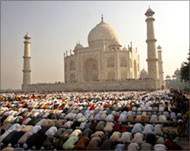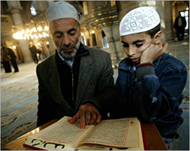Ramadan begins for world’s Muslims
Religious authorities in the Arab world have announced the beginning of the holy month of Ramadan on Tuesday, according to local media reports.

The three cities which house Islam’s most holy sites, the Haram al-Sharif in Makka, the Mosque of the Prophet Muhammad in Madina and the Noble Sanctuary of the Al-Aqsa Mosque in Jerusalem, will start fasting on Tuesday.
Religious authorities in Saudi Arabia, Kuwait, Qatar, the United Arab Emirates, Bahrain, Palestine, Jordan, Egypt and Iraq said the crescent moon was sighted after sunset, signalling the start of the month of Ramadan on 4 October.
In Jerusalem, the Mufti Shaikh Ikrima Sabri also announced late on Monday that the moon had been sighted and that fasting will begin on Tuesday.
Lunar calendar
Islam follows a lunar calendar which means that the months of the year are measured according to the revolutions of the moon around the earth (each month begins with the sighting of the new moon).
Because the lunar calendar is approximately 11 days shorter than the solar calendar used elsewhere, Islamic holidays “move” each year.
 |
|
More than one billion Muslims will |
This lunar calendar gives every month an opportunity of rotating through every season completing a cycle in which every month does not exceed 29 or 30 days.
The Muslim lunar calendar begins at the point of migration of the Prophet Muhammad from Makka to Madina 1426 years ago.
Ramadan is the ninth month of the lunar calendar, during which Muslims fast from before sunrise to after sunset. Nothing is consumed during daylight hours in this period.
For more than a billion Muslims around the world the month of Ramadan is a “month of blessing” marked by prayer, fasting, and charity.
Empathy with the poor
Ramadan has special significance since it is the month in which Muslims show empathy towards the poor and downtrodden.
Muslims practice sawm, or fasting, for the entire month of Ramadan.
This means they may eat or drink nothing, including water, while the sun shines.
During Ramadan in the Muslim world, most restaurants are closed during daylight hours. Families get up early for suhoor, usually a light meal eaten before the sun rises.
After the sun sets, the fast is broken with a meal known as iftar. Iftar usually begins with dates and sweet drinks that provide a quick energy boost.
Self-discipline
Fasting serves many purposes. Self-discipline is one of the primary objectives of the fast in which all physical contact between husband and wife is also abandoned in daylight hours for the duration of Ramadan.
 |
|
Muslims believe the Quran has |
Fasting is also an opportunity to practice self-control and to cleanse the body, mind and soul. Fasting helps Muslims feel the peace that comes from spiritual devotion as well as kinship with fellow believers.
After sunset the fast is ended with modest meals followed by devotional prayers until sunrise. This routine is maintained for 29 or 30 consecutive days.
Muslims also believe Ramadan to be the month of the Holy Quran – Islam’s holy book. They believe that this is the month in which the first verses of the Quran were revealed to the seal of prophets, Muhammad – Muhammad being the last prophet or messenger of Allah (God) on earth.
Preservation of Quran
During this month Huffadh (Muslims who have memorised the holy Quran) recite a thirtieth of the Quran, word for word in congregational prayers on a daily basis after the night prayer, which is approximately an hour and a half after sunset, for 30 consecutive days, until they have completed the whole Quran.
Muslims believe this is one of the ways in which the Quran has remained intact since revelation about 1400 years ago.
Fasting is one of the five pillars of Islam. The others are: belief in one God (Shahaadah); prayer (Salaah) – five times a day at its appointed times; alms-giving (Zakaat) – 2.5% of fixed assets annually; and pilgrimage (Haj) to Makka at least once in a lifetime.
Many Muslim countries operate a reduced working week to allow people time to perform the extra prayers associated with the month.